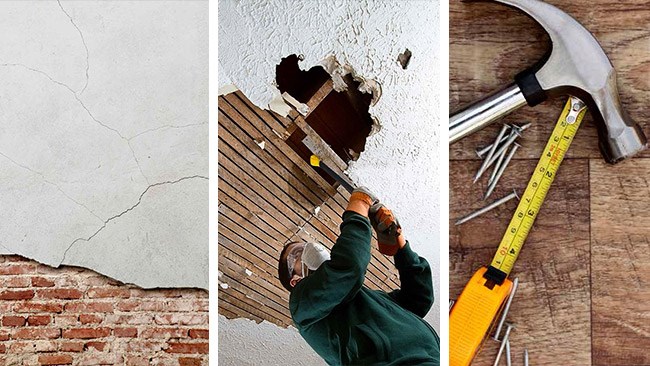Home buyers can cut through all the current confusion over the consumer protection act and property sales by insisting on an independent home inspection before they sign an offer.
It’s a fact, according to the Estate Agency Affairs Board (EAAB), that SA consumers are still likely to pay more attention to the condition of a second-hand vehicle than to the condition of a home they are about to buy. And sadly it appears that they may currently actually have less protection when buying a home than when buying a car – or even a pair of shoes – despite the implementation last year of the much vaunted Consumer Protection Act (CPA) along with the consumer commission and the National Consumer Tribunal.
Under this act, consumers have a clear right to return just about anything, from a cellphone to a ceiling fan, that is found to be defective, and to expect the item to be replaced or repaired to their satisfaction. they also have the right to ‘cool off’ – on contracts signed as a result of direct marketing and even to cancel certain long-term contracts. This legislation also apparently applies in exactly the same way to new homes acquired from developers, builders and institutions that sell property in the ‘ordinary course’ of their business. However, things get complicated when it comes to second-hand homes that are being sold by private owners whose usual business is not that of selling property, and even more indistinct when an estate agent is involved in the sale. previously, almost all home-sale agreements in SA contained a ‘voetstoots’ clause, which basically meant that the home was being sold ‘as is’ and that the buyer accepted it in this condition, with all its patent (visible) defects and any latent defects that had been disclosed by the seller. the clause protected the seller from any comebacks as a result of latent defects that he was not aware of at the time of sale – although not in the case of latent defects that were deliberately not disclosed or concealed.
The buyer was always free to delete the ‘voetstoots’ clause from the sale agreement, while sellers keen to emphasise the good condition of their homes and thus make them more attractive to buyers often deleted the clause themselves. Now though, there is some question as to whether the ‘voetstoots’ clause is still permissible at all, because in terms of the cpa, sellers – and perhaps their agents – appear to be liable for any material defects and hazards relating to a property, whether or not they were aware of them.
Some real-estate industry commentators argue that this should not apply when the seller is a private individual whose usual business is not selling property. indeed, says Richard Day, national GM of Pam Golding properties, it is ‘widely accepted that the CPA does not apply to once-off private transactions between sellers and purchasers of property where the seller’s ordinary course of business is not that of selling property’.
But others, including Consumer Commission deputy director Buyile Nopote, believe that once an estate agent becomes involved in any property sale, the ‘voetstoots’ clause is prohibited, because selling properties is the agent’s ‘ordinary course of business’. Legal opinions on this issue are still very divided, because there have been no test cases, but Trudie Broekemann, commercial director of Gunston attorneys, notes: "In terms of section 61 of the act, any supplier of goods, including a person who provides access to the goods, such as an estate agent, is liable for any harm caused if the goods are defective or unsafe. "This is a big change, and to be safe all agents will now have to review all their sale documents, promotional material and advertising, even where the property seller is not acting in the ordinary course of his business. A contravention of the act can lead to a fine of up to R1 million or 10% of turnover, whichever is the greatest."

Indeed, many agents worried that they could be held liable – months and even years after they have facilitated the sale of a property for home defects that the seller failed to disclose or chose to conceal at the time – have begun making use of detailed disclosure documents. "Essentially what these are supposed to do, says Adrian Goslett, CEO of RE/MAX of Southern Africa, is to get the seller to make sure all the necessary aspects of the property are in suitable working order, and indirectly give the buyer an implied warranty of quality on their purchase".
Disclosure documents are included as part of the sale agreement and signed off by the buyer, who is thus agreeing in writing to accept the property in its current condition and with the listed defects. so far, so good – but actually such documents really only protect the agent. The buyer still has no real guarantee at this point that the seller has listed everything and is not concealing certain defects in the property, or that there are not perhaps defects of which the seller is unaware.
In short, it’s back to square one – expensive repairs and probably a protracted court case – for the buyer of a second-hand home who has paid for and taken occupation of the property, only to find that there are all sorts of things wrong with it that he was never made aware of.
Or is it? In a recent post on its website (www.eaab.org.za), the EAAB says that estate agents should be aware that the home buyer is a consumer when dealing with the estate agent and that as such, buyers enjoy protection under the CPA as regards implied warranties and rights.
'Under the CPA the seller of a property, or the estate agents acting on their behalf, must not express or imply to the purchaser any false, misleading or deceptive representations concerning a material fact. the seller or agents may also not use exaggeration, innuendo or ambiguity regarding a material fact concerning the property. also the seller or agent may not fail to disclose a material fact concerning the property and may not fail to correct an apparent misapprehension on the part of the buyer.’
The EAAB also states unequivocally: ‘The rules of the property game have now changed because the CPA places the responsibility on the seller and his agent to make full disclosure to the buyer of the actual condition of the property that is changing hands.’
And in Nopote’s view, the agent cannot escape at least some liability when things go wrong. It makes no difference that the agent’s mandate is from the property seller who pays the agent’s commission, he says.
‘My own view is that while there may be no monetary agreement between the buyer and the agent, all business activities, including all marketing activities, are governed by the CPA. This means that an estate agent has to comply with all the provisions of the act not only in his dealings with sellers but also as a supplier of goods and services to buyers, and that the agent can be reported or sued by the buyer for misrepresentation or any other prohibited practice. And I believe the National Consumer Tribunal will also take this view of the agent’s role, so agents will have to review carefully all steps they customarily take in dealing with buyers.’
The point is moot, though, because the buyer who uncovers major undisclosed defects in the property he has just bought will probably still have to go through a lengthy process to get redress, no matter whether this comes from the seller, the agent or both. so once again, prevention rather than cure would seem to be the answer – and the EAAB concurs. It says that home inspection by an independent, accredited inspector prior to the conclusion of the sale is the answer, as it has been found to be in many other countries, notably the us and Canada, where some 66% of second-hand home sales now involve a home inspection, or ‘appraisal’ before the transaction is concluded.
Home inspection companies operating in SA and registered with the International Association of Certified Home Inspectors (InterNACHI) include inspectahome (www.inspectahome.co.za) Home inspector (www.homeinspector.co.za) and Housecheck (www.housecheck.co.za)
